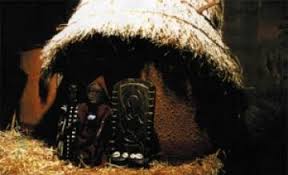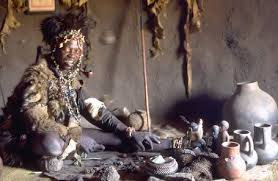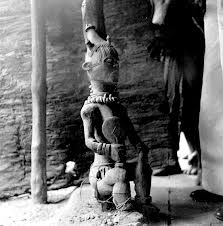Juju Economics
Posted by By Akogun Akomolafe at 7 November, at 22 : 35 PM Print

Warning: count(): Parameter must be an array or an object that implements Countable in /home/alaye/public_html/wp-content/themes/Video/single_blog.php on line 56
From My Archive
(a satire)
Like almost all opportunists Professor Koji Jubanga is a prostitute.
In his case, an intellectual prostitute. In the early 1960s, Koji Jubanga, then a young scholar, was a fire-breathing Marxist sporting the appropriate Karl Marx beard. Communist books and literature were cheap and sometimes free. The pubescent Marxist crammed his head full with communist patois. He worked himself into a frenzy to produce a thesis mouthfully-named: ‘The Imperatives of Marxism-Leninism in International Social, Economic, Political and Spiritual Transformations: The Nativity of its African Perspectives In Geo-Strategic Cum Political Terms – Focus, Scope, and Dimensions.’
Those who read the few circulated copies dismissed it as the most unscholarly of work. Its shoddiness alone put many fine souls away. But he was undaunted. He managed to penetrate the web of security at the Soviet embassy, got an audience with the Ambassador and presented his paper.
A few days later, he received a call. The Politburo had smiled on his thesis with approval. He was given the scholarship to study in the Soviet Union. Halfway through his studies, he was invited to a meeting by the KGB. He flunked his lie-detector test so badly that the KGB quickly arranged to have him degreed and sent back to Africa.
Nkrumahism was in vogue when he returned. Koji Jubanga wasted no time in declaring his allegiance to the new order. He labored for three weeks to produced another thesis bombastically-titled: ‘Osagyefoism: The Historical Connectivity of Black Consciousness through the Ages: From Kam (Egypt) to 20th Century Ghana. Its Theoretical and Practical Ramifications, Universality and Pre-Determinism.’He was amply rewarded for his efforts.
As a survivalist, he managed a stint with the Busia regime. He equally charmed is way into Acheampong’s Unity Government – producing an academic thesis suffused with hard-to-read scholarly jargons to support Acheampong’s brain-dead ideas. During the Revolution of 1978, he tried to worm his way into the new regime. The new leaders were not too impressed – if only because the young military officers couldn’t make a head or tail out of his dense thesis. The security check they ran on him sealed his fate.
For several years our learned scholar was in limbo. However, when the revolutionaries in government realised their folly and changed gear and embraced the IMF, Koji Jubanga saw his chance and plunged head-on to pluck it.
He labored day and night for three months to produce another grandiloquently-titled thesis: ‘Market-Economy – The Natural Order of Economic Determinism, Personal Self-Sufficiency, National Self-Determination, Cooperative Multilateralism, Inter-Global Dependency and the end of Bolshevik Socialism.’
He took it to a top Desktop Graphic Designer at Osu, where it was impressively polished up by one of the nation’s leading Desktop designers.
The IMF and their trumpeting quangoes needed a true believer to sell their ideas. Koji Jubanga was willing, for a fee, to become the Apostle of the new order. He presented his paper which wowed the big-wigs of the IMF. They made him a consultant – salaries and perks to be paid in dollars.
Professor Jubanga, like most new converts, became a zealot.
I ran into him at the Commonwealth Hall at Legon. He had delivered an impassioned, lukewarmly-received address at another of those endless World Bank Conferences on poverty in Africa. He was looking remarkably good. Sharp three-piece suit on a satin smooth skin, a designer glasses on a full face. He tools around town in a new Mercedes S-series and packs a mobile phone – the very latest model.
“Nice speech.” I lied after cornering him.
“Thank you, my friend. I am glad that some of us are beginning to see the light.”
“Light?” I wondered.
“Yes, some of us are turning around to jettison our ancient mindsets, however difficult, and recognizing the universality of the simple concepts I tried to elucidate. You see, the problem is that some of us are so wired to old ideas that we refuse to see reason even when it is thrown in our faces. Things simply cannot continue the way they were. We have to join the rest of humanity in embracing the forces of the market. It is then, and only then that we can truly join the rest of humanity. There is no hope for us if we want to get out of our ignorant-engendered poverty. The rest of humanity is marching triumphantly with the trend, so should we. No one is going to wait for us, no one! Historically, no country has got out of its economic mess and mass-poverty without obeying the principles of market forces. You see, if you look round you, the rest of the world are registering impressive economic growth. It is only Africa that is lagging behind. You see, things simply cannot continue the way it was. You see.”
“I see,” I said, not sure of what I saw.
Professor Jubanga cleared his throat and bellowed: “There are still a lot of our folks who believe that it is the business of government to continue to pour money into useless white-elephants. They believe that because the government was subsiding things four decades ago is enough reason to continue the wastage. You see.”
“Are we not mixing facts up with fictions here, professor?”
Professor Jubanga showed his displeasure by baring his teeth at me, “What do you mean? Who’s mixing facts with fictions?” He demanded, showing me an angry snarl.
“I don’t mean to be insulting, professor, but you seem to be lurching from point to point without actually tying them together. For a feeble-minded person like me, it all sounds so empty, even if grandiloquently so. Shall we begin with this market force thing, what exactly are we talking about?”
Convinced that I was not trying to put him down or prove to be his intellectual equal, the professor showed a benevolent smile at my humility. “Yeah, I agree that it is rather difficult to render a simple definition. We are talking about an economy whereby the state [represented by the government] has relinquished the commanding heights to private entrepreneurs. In contrast to our system whereby the government is playing the magician – conjuring up things, a market economy is controlled solely by the forces of the market. The beauty of it is that it is the only economics that does not need to be taught to anyone. It is so natural that every human being understands it. The main argument in its favor is that every country that embraced the principles of market forces is registering economic growth while those who refused to obey its laws are locked in their doldrums. Do you understand?”
“Hmm…” I said simply. I wanted the professor to continue with his passionate analysis.
Professorial baritone boomed, “You see. We have to work very hard (I can see that) to sell the ideas to our rather skeptical compatriots. Our people have to see reason. We have to join the rest of mankind in their triumphant march into prosperity…”
“You seem to be doing just fine.”
He misunderstood my sarcasm. I meant that he was looking after himself – the Oriental silk shirt, the Gucci shoes, and the gold Omega. Not too bad for someone working hard to sell ideas.
“Thank you. Where was I?”
“You were telling me how you want our people to march into prosperity. But are the arguments for the so-called market forces not specious? Actually, sir, I think that the arguments you just offered are outright lies.”
The professor’s mouth flew open and he’d problem closing it. It was as though I’d slapped him. “What,” he cried in a non-professorial tone. “I thought we’re on the same side!” The way he looked, I hope that he doesn’t rupture a blood-vein.
“It depends on what side we are talking about. When people argue that countries and regions have been developed by market forces, they either do not know what they are talking about or they are simply telling lies. If, as you pointed out, it means the government getting out of the commanding heights of the economy, I’ll say that it is only in Africa that people believe in the fiction that it is governmental interference that’s impeding our economic growth. No nation has been developed by market forces, none shall ever be.
Let’s make that Femi’s first principle of economic development. The fact of the matter is that every government is interfering in the national economy, one way or the other. No government has abandoned its economy to some mirage call market forces.
We can use Europe, Asia, and the U.S. as our case studies. Was the United States of America, today the greatest champion of the free-market hoopla, developed by market forces? Does the U. S. practice free trade? Was it not a U.S. president who said that the business of government is business? Was it not an American business leader who proclaimed that ‘What is good for General Motors is good for America?’ When I look at the United States, I find it difficult to see the demarcation line between business and government. Was it not American ministers that leads trade delegations and drive hard-bargains for U.S. businesses? Are the American fruit companies in Latin America not aided by the military and diplomatic muscles of the U.S. government? Are the roads of the American oil companies in the Middle East not paved by American diplomats and marines? A great many of the products American businesses sell around the world were developed by Pentagon scientists? Do American businesses not need their government approval to trade overseas? Have they not all been co-opted into the ideology of the U.S.? Do we see them breaking with their governments in its crusades around the world? Do American farmers not enjoying huge subsidies from Uncle Sam? The defense industries are so closely tied to the U.S. government that they are a virtual arm of the Pentagon. I recall a U.S. president lamenting the pervasive influence of what he called the Military-Industrial Complex on the American government. And if we are to believe these market-forces preachments, are we not right to ask why the U.S. government is always intervening to shore up the dollar and using its currency in its trade wars with Japan and China and the rest of the non-white world?
“Coming to Europe, we have to ask the pertinent question: could anyone who studies the history of the Industrial Revolution in Europe affirm that Europe was developed by market forces? Let the truth be told, it was slavery and colonialism that built European prosperity. It was the gold, the diamond, the spices and the human beings that Europe looted from around the world that formed the basis of the opulence that Europeans are flaunting today. Market forces played no part since the tradings and the raidings were tightly controlled by plutocrats who enjoyed Royal blessings. Are Europeans preaching ‘Free-Trade’ and market-forces practicing it? If so, why don’t they allow processed (if only partially) African goods into their ‘free markets?’ What about the huge subsidies they give to their farmers under the Common Agricultural Policy? Why are they keeping mountains of butter and rivers of wine, at great costs, to shore up prices? Why are European governments not allowing their currencies to find its true levels? Why are they forever prodding it up and fretting whenever it is going down?
“Asia offers the best argument against the proponents of market forces and free- trade. If the histories of European and American economic developments is too old for some of us, the Asians miracles happened in our lifetime. None of the Asian Tigers practiced free-trade, none of them followed the principles of market forces. They all closed their markets to all but the most essential imports, built up their industrial and commercial infrastructures, put in place tight trade policies and emerged as global competitors. Of course, they do not say that you cannot export goods to them, but they put in place such bureaucratic obstacles that it is not worth anyone’s time to try and break through. Study all of them – Japan, South Korea, Singapore, Taiwan and the newly emerging economies of Malaysia and China, what we find are tightly controlled economies. The Asians are no fools.
“What do we have in Africa? We take every preachment from Euro-Americans as akin to praxis. We are so gullible that we dance to their every tune. We do not observe; we only listen. We are the only people in the world who allow unrestricted imports to cripple our local industries. We are the only one who allows our currencies to fall without concern. We are the only people on earth who, uncritically, swallow everything we are told. A few years ago, we were told that democracy is the only way forward. We organized elections and put western political models in place. Our economies nose-dived. Those who are dictating to us went back to their laboratories and divined that free-market is our only salvation. We took to SAP the way dogs took to bones. For over a decade we have taken every prescription they proffered…”
The professorial gave me a withering look, glance at his watch. His professorial irritation was unmasked. “The problem with all your analyses is that you proffer no single solution. With communism gone, what is the alternative? What alternatives are you offering?”
“I offer none because I have none. I have no solution to Africa’s problem and I’ll not believe anyone who says that he has one. But we can learn from the others. We have swallowed the bitter pills of SAP for far too long and it is time to start asking questions. In the name of free trade, we have thrown open our ports to every junk from all over the world. We are the only people doing so. Our public services have been ravaged and thousands of public officers laid off. Our currencies are battered to the point of inutility. Our educational and health services have all but collapsed. What has gone wrong? That is the question we have to ask ourselves. We have to do a lot of soul-searching. And in this self-analysis, we should listen to no voice but ours. After all, who feels it knows it.
“The one factor I see in every country that has developed economically is that the people have great faith and confidence in themselves. The European in their heyday believed that they have a mission in the world. The same with the Americans – they are fervent nationalists. ‘I am proud to be an American; Most of us are. Our patriotism is fierce, if often quiet.’ – Robert J. Samuelson, Newsweek, March 11, 1996, p.2. Whatever their ideological orientation and political persuasion, Americans believe in the ‘American Dream,’ and they want nothing but to make their country the pre-eminent country in the world. We find the same among the Asians. The Japanese, the Chinese are nationalists to the point of xenophobic. The Koreans believe that they too can do. The slogan put up by the giant Samsung conglomerate on their headquarters sums it up. It simply says, ‘Koreans can do.’
“In Africa, we have lost faith in our ourselves and we have no confidence in our abilities. The Asians suffered the same colonial domination and exploitation like us, but they did not lose their essentially Asian character. The Indonesian wants to be nothing but an Indonesian, ditto the Korean, Malay, Chinese. In Africa, we are trying to run away from ourselves as fast as possible.”
“I have never listened to so much utter bunkum in my life. You have no answers to our problems, and about the only thing you do is pour scorn on those who have. You can’t be serious when you opined that the economic problems will be solved if Africans become xenophobes. Africa’s mass poverty will be eliminated by an ideology of nationalism, ah! So you truly believe that nationalism alone leads to economic prosperity, ah, ah, ah.” The professor laughs disdainfully.
I elected to ignore his pun, “I think that we are getting the wrong answers because we asked the wrong questions. To begin with, Africa is not poor, Africans are. There is a big difference between the two. Our continent, the second largest in the world, is the most resource-rich. The question we have to ask is why Africans, sitting on vast riches, are the most impoverished people on earth. That is the mother of all questions. Corrupt governments, lack of Western-style governments, tribalism and dictatorship are not enough reasons. They are too simplistic for the simple reason that African politicians are not more corrupt than their Belgian, Italian, American or Japanese counterparts. Africans are also not more clannish than say the Belgians or the Canadians. We are also not less democratic than the Koreans or the Taiwanese or the Chinese. For instance, China is not more democratic than, say, Ghana; its politicians are not less corrupt than their Ghanaian counterparts, and it has its own tribal problems. Why is it developing more rapidly than Ghana? When we consider all these, we have to come up with new questions and answers to our problems…”
“So you think that our problem is lack of sufficient analyses? You couldn’t have been more wrong, my friend. As Martin Luther King Jr. put it, we have even become paralyzed by our analysis. What more is there to analyze?”
“We have become paralyzed by analyzing the wrong things. Why can’t we ask ourselves why we are sentencing our best brains into economic exiles and then turn around to import expensive ‘experts’ from Euro-America whom we pay in dollars? Why are we not asking how the Israelis manage to get our diamonds, add some values to it and export it to Japan and become the only country in the world having a trade surplus with the land of the rising sun? Why are we not asking of those who say that we should turn our currencies into Monopoly currency why they keep shoring up theirs? Why do we believe those who tell us to let market forces take care of our economy when we see the same people parenting theirs like newly-born babies? Why are we not asking those who said we should cut subsidies to our industries and our farmers why they keep subsidizing theirs? Why are those who say that we should allow our banks to fail keep propping-up their failing SLs and other financial institutions? Why are the apostles of free-trade and market-forces rescuing industries such as Chrysler? If ‘Free-trade’ and market forces are the only vehicle to economic prosperity, how did South Korea, China, Taiwan, and Singapore managed to develop without it?
“The sad truth, the only one I can see is that we are poor not because we are not practicing free-trade or not obeying the principles of market forces. We are poor only because we have abandoned all hope to help ourselves. With child-like helplessness, we have put our faith into the hands of foreigners. Our confidence is so battered that we think that we need to be continually led. Africans are poor because foreigners are mismanaging our affairs. No country has been developed by foreigners, however benevolent, and none shall ever be. We can make that Femi’s second principle…”
The professor cut me short, “What we see here are lots and lots of criticism, none of them constructive. We have embarked on a new course, why are you impatient to see the germinating results?”
“Unless you’re into some esoteric particle physics experiment, three-decade is long enough time to see some result of your experiment? When are we going to start to see the benefits you painted for us? When are we going to enjoy the paradise you pictured for us? We have fulfilled our part of the bargain, when are you going to deliver on yours? When is the promised investment going to start coming? If you are honest, sir, won’t you agree that the whole thing boils down to some Juju economics?”
“Juju Economics.” The professor wondered.
“Former President Bush lambasted Reaganomics as ‘Voodoo Economics,’ I’ll call ours Juju Economics because it was premised on the same false assumptions. We have decimated our middle class, SAPped our poor class with the hope that the rich will invest more to trickle down. This hasn’t happened. Our professionals are cleaning toilets in Euro-America; some of our poor masses are selling Korean dog-chains on the highways, others drinking and smoking away their lives, the rest are roaming our streets with lynching intentions. Instead of putting their tax breaks into productive investment, the rich people simply build more houses for themselves, buy more Pajeros, acquire more mobile phones and go on overseas holidays with their girl-friends. The foreign investors, those who, we were told, will deliver us to the gates of heaven are not investing in any productive projects in our country. They are only excavating our minerals and shipping them raw to their countries. The Arabs and the Asians are only building nightclubs and gambling halls, turning more and more of our women into whores. The Euro-Americans are building fast- food joints and Soft-drink (they say) Bottling companies, turning us into western junks consuming junkies.
“I have a big ax to grind with our intellectuals. They’ve failed us!” I cried, vibrating with passion. “Look,” I shouted, trembling with emotion, “What do they do except re-hash what Euro-American scholars are saying. Are they giving us original thoughts? I don’t want to get personal, but intellectual prostitutes like yourself are our biggest problems. The job of intellectuals is to help generate original ideas to suit the peculiarities of their societies. What are African intellectuals doing? They either run away to Euro-America and rail against the inadequacies at home or stay at home and become prostitutes. If by tomorrow the IMF and the World Bank should divine that SAP has, after all, being an unmitigated disaster, I bet that you’ll find yourself singing the new chorus with the same calenture.”
“That’s not fair,” the professor said dejectedly.
I responded sharply, “What is not fair is your painting your personal comfort in patriotic halo and confusing your own happiness with our national well-being.”
About the Author
Femi Akomolafe is a passionate Pan-Africanist. A columnist for the Accra-based Daily Dispatch newspaper and ModernGhana, and Correspondent for the New African magazine, Femi lives in both Europe and Africa and writes regularly on Africa-related issues for various newspapers and magazines.
Femi was the producer of the FOCUS ON AFRICANS TV Interview programme for the MultiTV Station.
He is also the Man and Machine Coordinator at Alaye Dot Biz Limited, a Kasoa-based Multimedia organisation that specialises in Audio and Video Production. He loves to shoot and edit video documentaries.
His highly-acclaimed books (“Africa: Destroyed by the gods,” “Africa: It shall be well,” “18 African Fables & Moonlight Stories” and “Ghana: Basic Facts + More”) are available for sales at the following bookshops/offices:
- Freedom Bookshop, near Apollo Theatre, Accra.
- The Daily Dispatch Office, Labone – Accra
- WEB Dubois Pan-African Centre, Accra
- Ghana Writers Association office, PAWA House, Roman Ridge, Accra.
- African Kitchen in Amsterdam Bijlmer
Where to buy them online:
On Lulu Books:
18 African Fables & Moonlight Stories https://goo.gl/Skohtn
Ghana: Basic Facts + More: https://goo.gl/73ni99
Africa: Destroyed by the gods: https://goo.gl/HHmFfr
Africa: It shall be well: https://goo.gl/KIMcIm
Africa: it shall be well
on Kindle books: https://www.createspace.com/4820404
on Amazon books: http://goo.gl/QeFxbl
on Lulu Books: https://goo.gl/SQeoKD
Africa: Destroyed by the gods
on Kindle books: https://www.createspace.com/4811974
on Amazon books: http://goo.gl/1z97ND
on Lulu Books: http://goo.gl/KIMcIm
My Lulu Books page: http://www.lulu.com/spotlight/FemiAkomolafe
Get free promotional materials here:
- Africa: it shall be well: http://alaye.biz/africa-it-shall-be-well-introduction-in-pdf/
A FREE Chapter of ‘Africa: It shall be well’ could be downloaded here: http://alaye.biz/africa-it-shall-be-well-a-free-chapter/
- Africa: Destroyed by the gods (How religiosity destroyed Africa) http://alaye.biz/africa-destroyed-by-the-gods-introduction/
A FREE Chapter of ‘Africa: Destroyed by the gods’ could be downloaded here: http://alaye.biz/africa-destroyed-by-the-gods-free-chapter/
Contact Femi:
Femi’s Blog: www.alaye.biz/category/blog
Website: www.alaye.biz
Femi on Amazon https://www.amazon.com/author/femiakomolafe
Twitter: www.twitter.com/ekitiparapo
Facebook:https://www.facebook.com/alayeclearsound;
Gmail+: https://plus.google.com/112798710915807967908;
LinkedIn: www.linkedin.com/in/femiakomolafe
Email: fakomolafe@gmail.com
My Profile on New African magazine: http://newafricanmagazine.com/tag/femi-akomolafe/
Kindly help me share the books’ links with your friends and, grin, please purchase your copies.
Comradely,
Femi Akomolafe








